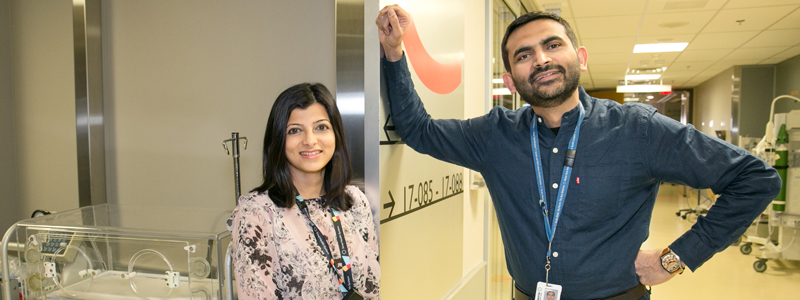

It doesn’t just happen on your favourite hospital TV drama like Grey’s Anatomy — passionate and loving relationships can be found throughout the departments, clinics and research labs in real-life healthcare settings, even at Mount Sinai Hospital. Not only do these couples share a passion for each other, but they also share a passion for what they do, delivering connected care to the patients and families who need it most.
One story that will surely have hearts fluttering is that of husband and wife team, Dr. Amish Jain and Dr. Poorva Deshpande, who share a love for helping the most vulnerable babies, a calling that has kept them on a parallel professional path, making the Newton Glassman Charitable Foundation’s Neonatal Intensive Care Unit (Glassman NICU) at Mount Sinai their home away from home.
Their story begins in India. On their first day of medical school back in 1996 in Nagpur, India, amongst the crowd, Amish saw for the first time his future wife Poorva, and they have been inseparable ever since. They married soon after finishing medical school and continued on their academic journey together.
They both completed their residency in the United Kingdom before making their way to Canada. Before landing at Mount Sinai, they also did a fellowship at SickKids together. Now their offices are only a few doors down from one another. Just as they are a great team in their personal life, their clinical work and research initiatives intertwine and complement each other beautifully.
Dr. Jain is a staff neonatologist and Dr. Deshpande is a junior staff in the Glassman NICU. Their research focuses on our tiniest patients, preemies. Mount Sinai sees approximately 1,000 premature babies each year, many of them born here at the hospital. Dr. Jain’s and Dr. Deshpande’s research area looks at the function of a premature baby’s heart and lungs.
Dr. Jain’s research focuses on understanding the heart function and blood flow through the heart and lungs, a common problem in sick babies. He uses high-resolution ultrasound (echocardiography) to investigate these tiny organs. Dr. Deshpande looks at how brain functions are affected by changes in blood flow and how we can preserve the brain function in the event of sickness. She develops strategies to protect the brain from long-term neurological problems. Together, they are advancing the hearts and minds of these fragile newborns.
Understanding one another has been a key to their successful relationship. “With such demanding careers, the best part is we get to see each other every day and have lunch together.” When their work does take over, they divide and conquer; when one of them needs to be at the hospital, the other can be at home taking care of their two sons.
One of the things that made both of them fall in love with this work is the resilience of the babies and strength of the families. For them, sharing their life’s work and advancing research to help give these babies the best chance at life is incredibly meaningful.